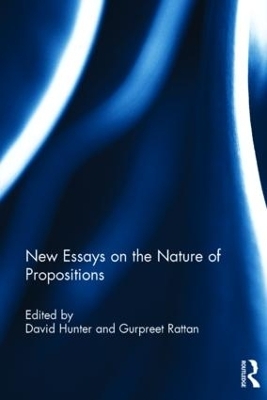
New Essays on the Nature of Propositions
Routledge (Verlag)
978-1-138-85899-2 (ISBN)
Some recent theorizing doubts whether propositions really exist and, if they do, asks how we can grasp, entertain and know them? But most of the doubt concerns whether the abstract approach to propositions can really explain them. Are propositions really structured, and if so where does their structure come from? How does this structure form a unity, and does it need to? Are the representational and structural properties of propositions really independent of those of thinking and language? What does it mean to say that an object occurs in or is a constituent of a proposition?
The volume takes up these and other questions, both as they apply to the abstract object approach and also to the more recently developed approaches. While the volume as a whole does not definitively and unequivocally reject the abstract objection approach, for the most part, the papers explore new critical and constructive directions. This book was originally published as a special issue of the Canadian Journal of Philosophy.
David Hunter is Associate Professor at Ryerson University, Toronto, Canada. He works on issues at the intersection of belief and action, and is the Editorial Board Coordinator of the Canadian Journal of Philosophy. Gurpreet Rattan is Associate Professor at the University of Toronto, Canada. His primary interests are in the philosophy of language, mind, and epistemology. His current project attempts to articulate unified accounts of truth, disagreement, and relativism, accounts organized around the semantics and epistemology of the metarepresentation involved in critical reflective thinking and disagreement. His longer term project is on the comparative metaphysics and epistemology of propositions and numbers.
1. Introduction Part I: On Act- and Language-Based Conceptions of Propositions 2. Two aspects of propositional unity 3. An empirically-informed cognitive theory of propositions 4. What are the primary bearers of truth? 5. Not the optimistic type 6. Why it isn’t syntax that unifies the proposition 7. Why we should not identify sentence structure with propositional structure Part II: Constituents and Constituency 8. Individuating Fregean sense 9. The metaphysics of propositional constituency Part III: Theoretical Alternatives to Propositions 10. Propositions, attitudinal objects, and the distinction between actions and products 11. What are Propositions? 12. Conversational implicature, communicative intentions, and content 13. Propositions and higher-order attitude attributions Part IV: Modal Metaphysics 14. Unnecessary existents 15. Contingently existing propositions
| Erscheint lt. Verlag | 20.5.2015 |
|---|---|
| Verlagsort | London |
| Sprache | englisch |
| Maße | 156 x 234 mm |
| Gewicht | 589 g |
| Themenwelt | Geisteswissenschaften ► Philosophie ► Erkenntnistheorie / Wissenschaftstheorie |
| Geisteswissenschaften ► Philosophie ► Metaphysik / Ontologie | |
| Geisteswissenschaften ► Philosophie ► Sprachphilosophie | |
| ISBN-10 | 1-138-85899-4 / 1138858994 |
| ISBN-13 | 978-1-138-85899-2 / 9781138858992 |
| Zustand | Neuware |
| Haben Sie eine Frage zum Produkt? |
aus dem Bereich

![Was heißt Denken?. Vorlesung Wintersemester 1951/52. [Was bedeutet das alles?] - Martin Heidegger](/media/113619842)
